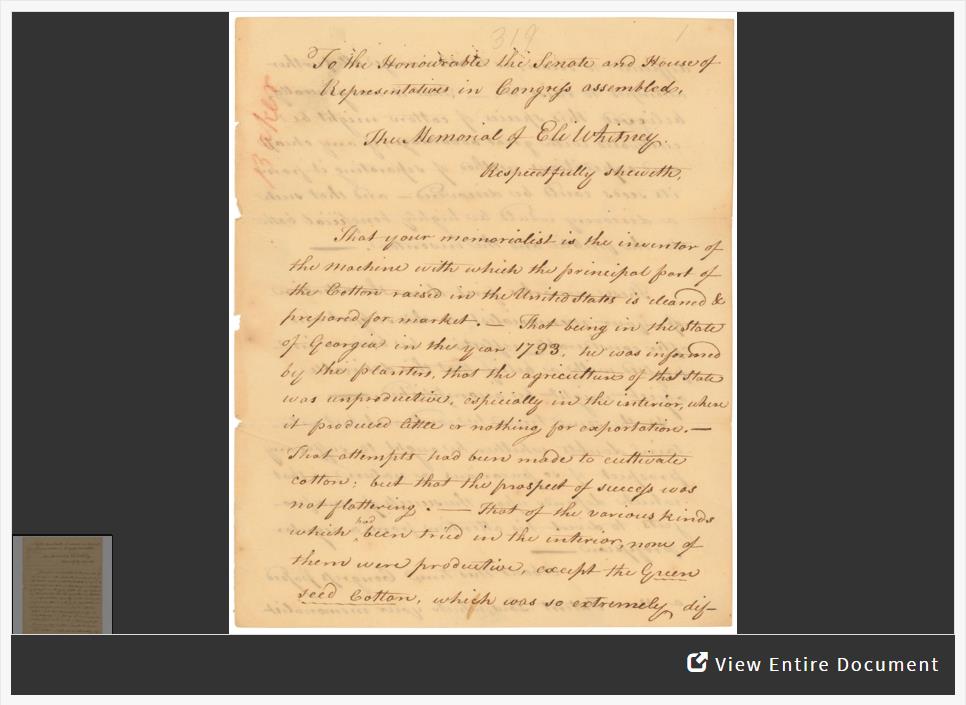In this activity, students will analyze a petition filed by Eli Whitney with Congress to renew his patent on his infamous invention - the Cotton Gin. Due to a loophole in the 1793 patent law, competitors were able to make cotton gins without his permission. Though he pursued a solution to this patent infringement in the courts, he was not always successful. Whitney filed this petition with Congress because his patent was set to expire.
Suggested Teaching Instructions
This activity can be used during a unit on slavery or intellectual property. For grades grades 6-12. Approximate time needed is 45 minutes.
Building off analysis of the Cotton Gin patent drawing itself, remind students the reason that the U.S. Constitution gives Congress the power to grant patents to inventors. Tell students that patents give the inventor a temporary monopoly on his products to encourage a person to invent products. After a set number of years, the patent expires and the product enters the public domain.
Direct students to read the memorial, paying particular attention to the following questions:
- What was the author's purpose in writing this document?
- What evidence does the author provide to support his argument?
Note: As a modification, complete a jigsaw activity by dividing students into 4 groups, giving each group two pages of the memorial to focus on.
After students read the petition, lead a discussion on the questions above. After discussing Whitney's purpose of renewing his patent, list the arguments he provided to support his case. They include that:
- The only productive Cotton crop that could grow in many areas of the South was green seed cotton, but that it was difficult to remove the seeds from this crop.
- The patent law passed by Congress inspired him to work on the invention because it proved that his rights and property would be protected.
- He devoted his time and energy to taking his original idea into a practical invention.
- He took out a patent on his invention to protect his intellectual property.
- The cotton gin worked so well that the Southern planters began growing green seed cotton to such an extent that it became the most popular crop in the country.
- His patent was ignored by many of these planters who were profiting off of his idea, so he had to turn to the courts for justice.
- These cases took a long time and, due to a loophole in the law that would not be fixed until 1800, he lost many of these cases.
- After he started to win in court under the new law, 13 years of his patent term had expired.
- He did not receive the fair amount of compensation for his invention.
- His invention made the work of one man equal the work of a 1000 men before the invention.
After discussing these and other claims, ask students to choose which three claims they feel are the most valid. Discuss their opinions.
Poll the class as to whether they would have voted in favor or against renewing his patent.
Share with students additional historical background concerning the cotton gin. For example, that the most important aspect of the invention of the cotton gin is something that Eli Whitney never mentions in his petition: slavery.
While it was true that the cotton gin reduced the labor of removing seeds, it did not reduce the need for slaves to grow and pick the cotton. Cotton growing became so profitable for the planters that it greatly increased their demand for both land and slave labor. Because of the cotton gin, slaves labored on ever-larger plantations where work was more regimented and relentless.
Extension activity: Students can draft an argument in writing to answer the following:
Imagine you were a member of Congress that received this petition from Eli Whitney. Would you have voted in favor or against Eli Whitney's petition to renew his patent for the cotton gin? Why or why not?
This activity is adapted from an article written by Joan Brodsky Schur, a teacher at Village Community School, in New York, NY.




